Advanced hardware lab 8-3: select and install network hardware – In the realm of advanced hardware, Advanced Hardware Lab 8-3: Selecting and Installing Network Hardware emerges as a crucial aspect. This lab delves into the intricate details of network hardware selection and installation, empowering readers with the knowledge and skills to navigate this complex technological landscape.
Network hardware serves as the backbone of any network infrastructure, facilitating seamless communication and data exchange. Understanding the key factors to consider when selecting network hardware, the step-by-step installation process, and the essential configuration and testing procedures is paramount for ensuring optimal network performance.
Advanced Hardware Lab 8-3: Select and Install Network Hardware

Network hardware is a critical component of any computer network, providing the physical infrastructure for data transmission and communication. Selecting and installing the appropriate hardware is essential to ensure optimal network performance, reliability, and security. This article provides a comprehensive guide to the hardware selection considerations, installation process, network configuration, troubleshooting common issues, and best practices for hardware management.
Hardware Selection Considerations, Advanced hardware lab 8-3: select and install network hardware
When selecting network hardware, it is important to consider the following key factors:
-
-*Performance
The hardware should be able to handle the anticipated network traffic load, including data transfer rates, number of devices, and network protocols.
-*Compatibility
The hardware must be compatible with the existing network infrastructure, including the operating systems, network protocols, and other hardware devices.
-*Cost
The cost of the hardware should be within the budget constraints, while still meeting the performance and compatibility requirements.
Different types of network hardware include:
-
-*Routers
Routers connect different networks and determine the best path for data packets to take.
-*Switches
Switches connect devices within a single network, providing high-speed data transfer.
-*Firewalls
Firewalls protect networks from unauthorized access and malicious traffic.
Popular Questions
What are the key factors to consider when selecting network hardware?
Performance, compatibility, and cost are the primary factors to consider when selecting network hardware.
What are the different types of network hardware available?
Routers, switches, and firewalls are the most common types of network hardware.
What is the importance of following proper installation procedures for network hardware?
Following proper installation procedures ensures optimal performance and minimizes the risk of hardware issues.


